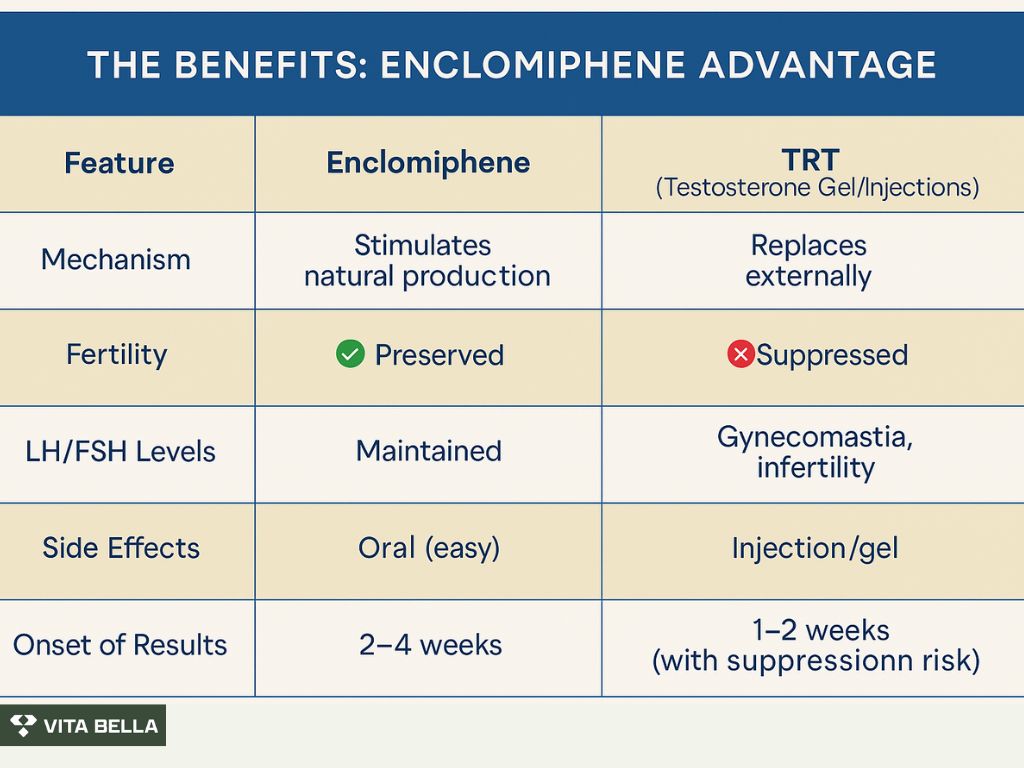Feeling constantly tired, unfocused, or not quite yourself? It might not just be stress, it could be your hormones signaling for help. Men with low testosterone or hypogonadism often face a difficult choice: take external testosterone and risk fertility loss, or use a fertility-friendly modulator that stimulates the body’s own production. Enclomiphene 1 offers a compelling solution. In fact, it can raise testosterone levels while preserving sperm health.
Your hormones shape your energy, focus, and confidence. Vita Bella’s enclomiphene therapy empowers men to restore testosterone levels the natural way, enhancing vitality and performance while preserving fertility and wellness. Experience the power of science-backed hormone restoration and take the first step toward feeling stronger, sharper, and more alive with Vita Bella.
What do you understand about Low Testosterone and Hypogonadism?
Low testosterone (also called hypogonadism) affects millions of men worldwide, leading to fatigue, reduced libido, mood swings, and loss of muscle mass. Traditional testosterone replacement therapy (TRT) can normalize hormone levels but often suppresses sperm production, posing a dilemma for men who wish to maintain fertility.
Enclomiphene, an oral therapy derived from clomiphene citrate, provides a more natural alternative. It enhances the body’s internal hormone regulation, restoring testosterone without compromising reproductive health.
How Enclomiphene Works?
Enclomiphene is a selective estrogen receptor modulator (SERM). It blocks estrogen’s negative feedback at the hypothalamus and pituitary, which triggers increased GnRH release. That, in turn, elevates LH and FSH, stimulating the testes to produce testosterone naturally without suppressing spermatogenesis.
1- Restores Testosterone Levels Rapidly
In a Phase II clinical trial 2 involving 52 men, enclomiphene induced significant increases in total testosterone within just two weeks. Additionally, in a pooled analysis of multiple trials 3 comparing oral enclomiphene citrate and topical testosterone gel, both treatments raised serum testosterone, yet enclomiphene did so with a lower risk of hematocrit elevation.
2- Preserves or Enhances Fertility
Unlike testosterone replacement therapy (TRT), which suppresses LH and FSH and reduces sperm production, enclomiphene maintains or improves spermatogenesis. In that Phase II trial 1, semen counts remained stable despite testosterone increases.
In a retrospective comparative study 4 of 66 men, enclomiphene use was associated with preserved sperm parameters and gonadotropin levels over time.
3- Lower Estrogenic Side Effects Compared to Clomiphene
Clomiphene is a racemic mixture of enclomiphene and zuclomiphene; the latter has estrogenic activity and a long half-life, which can lead to side effects.
In that same retrospective cohort 4 of 66 men, adverse events (e.g., decreased libido, fatigue, mood swings) occurred much less frequently with enclomiphene. The odds ratio for side effects was 0.18 (95% CI: 0.07–0.44). Also, estradiol change was –5.92 pg/mL for enclomiphene vs +17.50 pg/mL for clomiphene (P = 0.001).
4- Better Safety Profile with Lower Risk of Adverse Events
In the same comparative study, the frequency of documented side effects was significantly lower on enclomiphene than on clomiphene (3.45% vs 18.18%). Furthermore, long-term pooled data suggest 3 enclomiphene is less likely to raise hematocrit compared to exogenous testosterone therapy.
5- Oral, Noninvasive, and Fertility-Friendly
Enclomiphene is orally administered (commonly 12.5–25 mg daily), which makes it convenient for long-term therapy. Because it stimulates endogenous testosterone rather than replacing it, enclomiphene avoids common systemic risks associated with TRT (e.g., suppression of the hypothalamic-pituitary axis).

What are Practical Expectations and Monitoring for Enclomiphene?
During enclomiphene therapy, men can expect noticeable hormonal improvements within 3–4 weeks, with enhanced energy, mood, and libido typically occurring by 2–3 months. Other things to look for include:
Onset of effect: Hormonal markers (LH, FSH, testosterone) typically improve within 2–4 weeks.
Clinical changes: Improvements in energy, libido, mood, and overall wellness usually become noticeable by 2–3 months.
Long-term stability: Testosterone levels tend to stabilize by 6 months, while fertility parameters remain preserved.
Monitoring: It’s advisable to check total/free testosterone, LH, FSH, estradiol, semen analysis, hematocrit, and liver function every 3–6 months.
What is its Safety and Tolerability Profile?
Enclomiphene produced fewer adverse events and more stable testosterone and LH levels compared with clomiphene or TRT. Across multiple studies, enclomiphene has shown excellent tolerability:
Minimal changes in hematocrit or lipid profiles
No suppression of spermatogenesis
Low incidence of mood or libido changes
Find Your Power Again Through Hormonal Balance
When low testosterone disrupts your energy and focus, it’s time to act. Vita Bella’s enclomiphene therapy empowers your body to restore hormonal balance naturally, helping you regain control, rebuild confidence, and rediscover your best self. Backed by clinical research and designed to work with your body’s natural rhythm, this fertility-friendly approach enhances testosterone levels without harsh side effects or dependency.
Experience renewed energy, sharper focus, and lasting stamina all through a safe, non-invasive solution tailored to your unique needs. With Vita Bella, you’re not just treating symptoms, you’re reigniting your potential from the inside out.
FAQs
Is enclomiphene effective for treating low testosterone in men?
Yes, enclomiphene has been shown in multiple human clinical trials to effectively raise total and free testosterone levels in men with secondary hypogonadism. In a 2014 randomized study published in Fertility and Sterility, most participants achieved normal testosterone ranges within 2–3 months of treatment while maintaining fertility.
Does enclomiphene affect sperm count or fertility?
No, enclomiphene does not negatively impact sperm production. Unlike traditional testosterone replacement therapy (TRT), which suppresses LH and FSH and can reduce sperm count, enclomiphene preserves or even enhances spermatogenesis. Studies demonstrate stable or improved sperm motility and concentration during therapy.
Is enclomiphene safer than clomiphene for long-term use?
Yes, enclomiphene generally causes fewer estrogen-related side effects because it lacks the long-acting zuclomiphene isomer found in clomiphene. In comparative studies, men switching from clomiphene to enclomiphene reported fewer issues like mood changes, fatigue, or gynecomastia, and showed lower estradiol levels (–5.92 pg/mL vs. +17.5 pg/mL).
Can enclomiphene replace testosterone replacement therapy (TRT)?
Yes, for many men, enclomiphene can serve as a natural alternative to TRT. By stimulating the body’s own hormone production, it raises testosterone while maintaining fertility and avoiding the suppression of the hypothalamic–pituitary–gonadal axis common with exogenous testosterone treatments.
References
Wiehle, R. D., Fontenot, G. K., Wike, J., Hsu, K., Nydell, J., Lipshultz, L., & The ZA-203 Clinical Study Group. (2014). Enclomiphene citrate stimulates testosterone production while preventing oligospermia: A randomized phase II clinical trial comparing topical testosterone. Fertility and Sterility, 102(3), 720–727. https://doi.org/10.1016/j.fertnstert.2014.06.004
Kaminetsky, J., Werner, M., & Wiehle, R. D. (2017). Oral enclomiphene citrate stimulates the endogenous production of testosterone and sperm counts in men with low testosterone: Comparison with testosterone gel. Journal of Sexual Medicine, 14(12), 1503–1512. https://doi.org/10.1016/j.jsxm.2017.10.009
Pastuszak, A. W., Wiehle, R. D., Fontenot, G., Podolski, J., & Lipshultz, L. I. (2015). Comparison of the effects of oral enclomiphene citrate and topical testosterone gels treatment on serum hormones, erythrocytosis, lipids, and prostate-specific antigen. Journal of Sexual Medicine, 12(Supplement 2), 129. https://doi.org/10.1111/jsm.12901
Saffati, G., Kassab, J., Orozco Rendon, D., Hinojosa-Gonzalez, D. E., Kronstedt, S., Lipshultz, L. I., & Khera, M. (2024). Safety and efficacy of enclomiphene and clomiphene for hypogonadal men. Translational Andrology and Urology, 13(9). https://doi.org/10.21037/tau-24-238





















